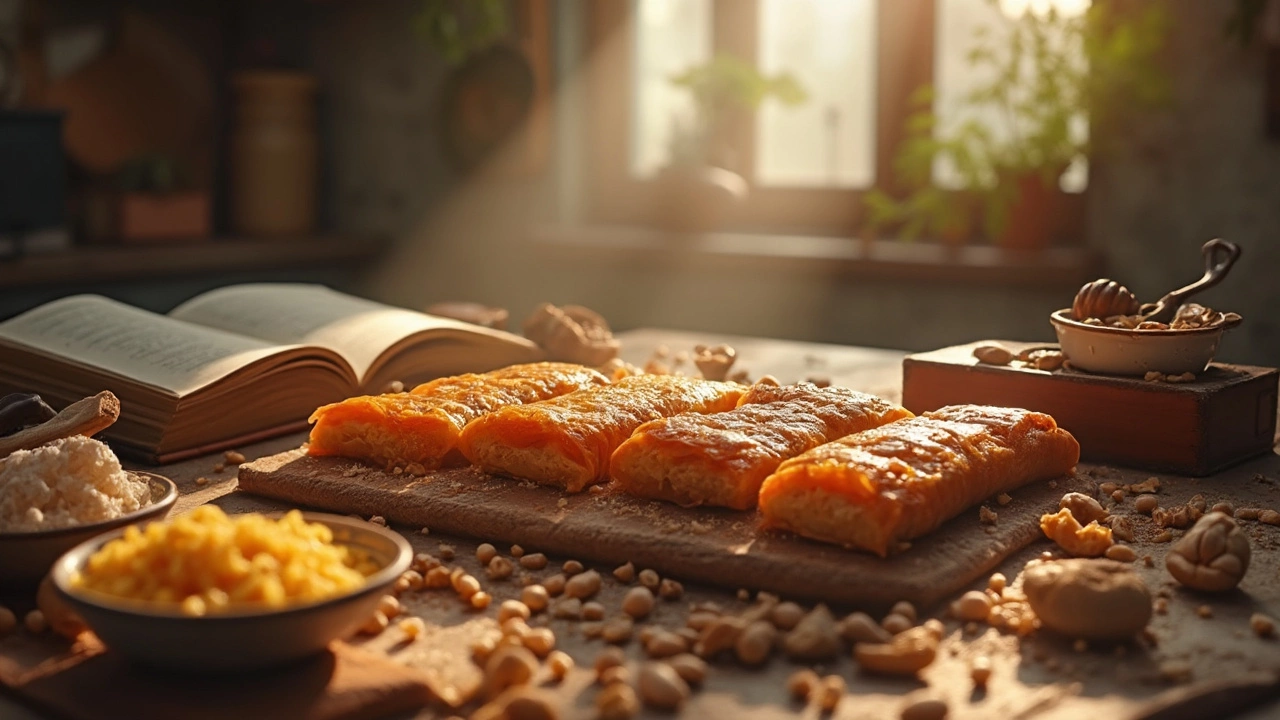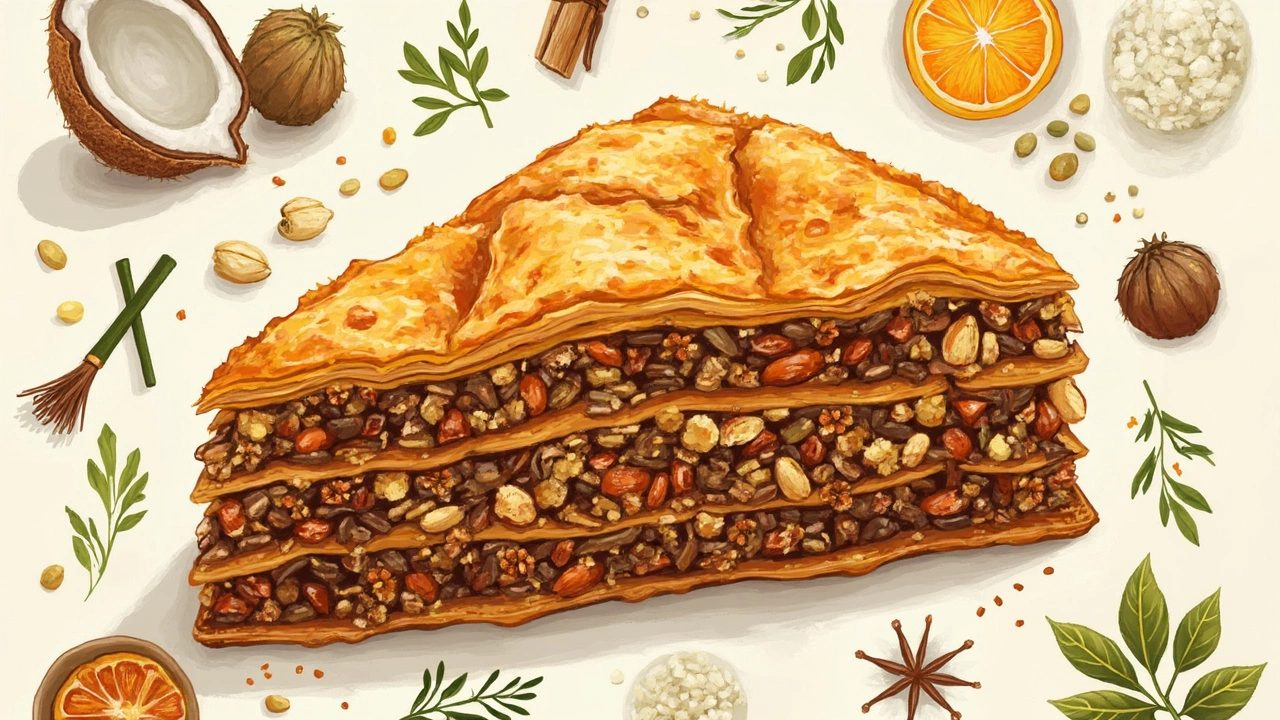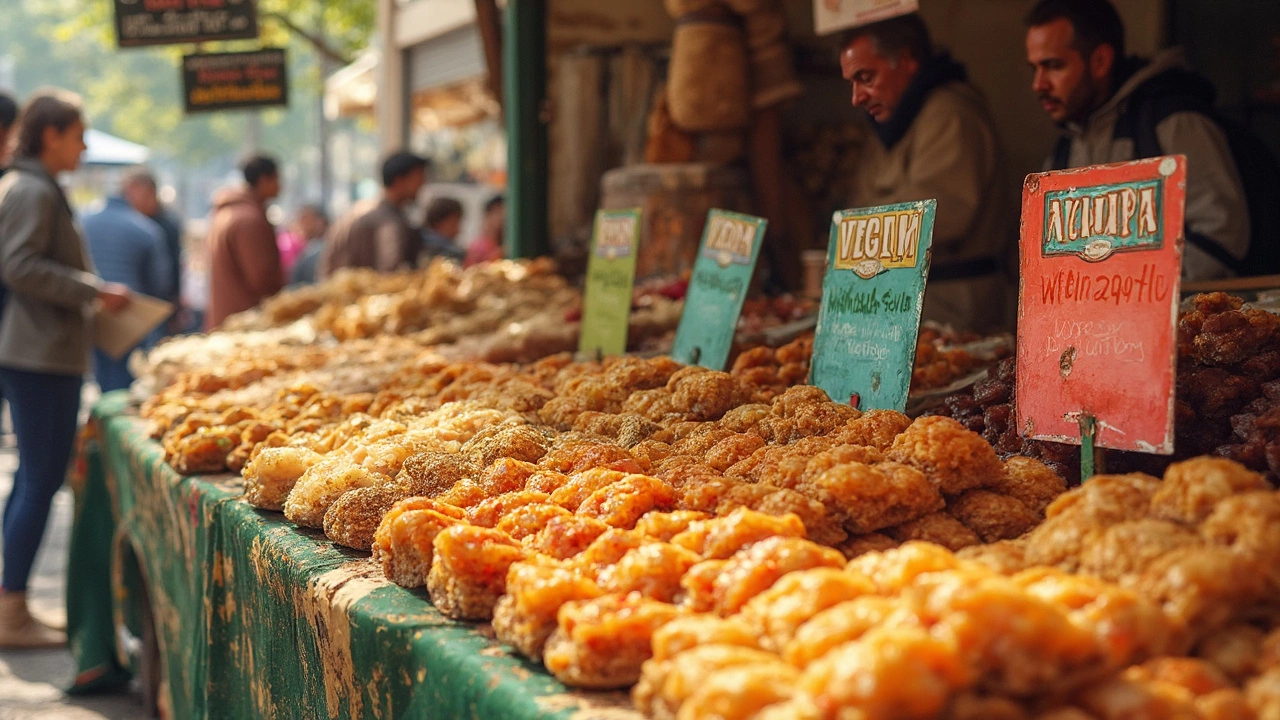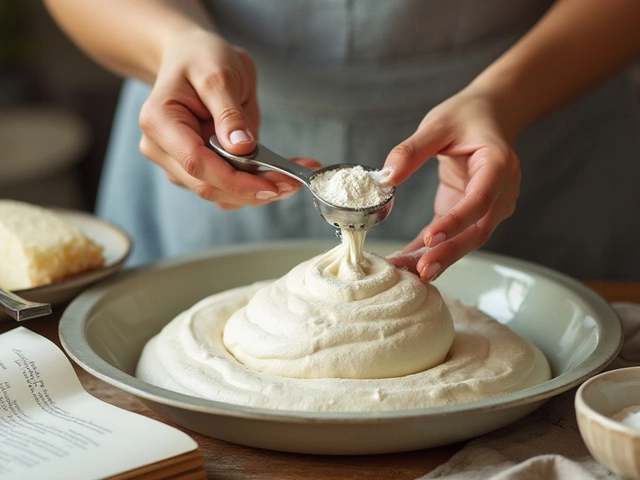
So, you’ve set your sights on that mouth-watering baklava at the local bakery. It’s flaky; it’s sweet; it’s everything you ever dreamed of in a dessert. But is it vegan? Unfortunately for plant-based eaters, traditional baklava usually isn't.
Why's that, you ask? Well, it all comes down to a couple of sneaky ingredients: honey and butter. You see, these two play fairies when it comes to keeping things moist and rich, but they’re very much animal-derived. Honey, coming straight from our buzzing friends, the bees, and butter, often churned from cow’s milk, throw the vegan label right out the window.
But don't lose hope! There are fantastic vegan alternatives out there. Think agave syrup or maple syrup in place of honey, and coconut oil or vegan margarine instead of butter. These swaps not only make your baklava vegan-friendly but also leave plenty of room for creativity.
- Traditional Ingredients of Baklava
- Why Honey and Butter Aren't Vegan
- Exploring Vegan Alternatives
- Tips for Making Vegan Baklava
- Buying Vegan-Friendly Baklava
Traditional Ingredients of Baklava
Baklava is a classic dessert that’s as much about its history as it is about its flavor. People often associate it with Middle Eastern and Mediterranean cuisine, but it’s relished worldwide. What makes it so delectable? Let’s break down its traditional ingredients.
Filament-Thin Phyllo Dough
The heart of any good baklava starts with phyllo dough. This dough is stretched unbelievably thin to achieve that signature flakiness. Layered up like a delicious puzzle, the dough gives baklava its signature crispness. But here's the hitch—while phyllo is usually vegan, the stuffings aren’t always friendly!
Nutty Heaven: Walnuts and Pistachios
Nuts are critical to baklava’s unique crunch and texture. Most traditional recipes feature walnuts or pistachios, or sometimes a mix. These nuts are finely chopped and spread between the thin phyllo layers to add that rich, nutty texture. They're totally vegan, so no worries here!
Sweeten the Deal: Honey Syrup
Now, let's talk sweetness. Honey syrup is what gives baklava its gooey, sticky loveliness. Sadly, this natural sweetener is the main non-vegan culprit, bringing bees into the mix. Imagine a luscious syrup poured generously over those gorgeous phyllo layers to soak up perfectly.
To Butter or Not to Butter
Another ingredient keeping baklava out of the vegan desserts category is butter. It’s melted and brushed liberally between layers of dough to help them brown beautifully. Although it adds flavor and texture, butter is a no-go for vegans due to its dairy origins.
Spice It Up: Cinnamon and Cloves
For that extra dimension of flavor, spices like cinnamon and sometimes cloves make an appearance in traditional recipes. These spices are all vegan and add a warm, aromatic kick that complements the nutty sweetness perfectly.
This traditional lineup makes baklava what it is—delicious layers of indulgent textures and flavors. But for those seeking vegan alternatives, it's the honey and butter that need some attention. Swap these out, and you’re onto a plant-based winner!
Why Honey and Butter Aren't Vegan
Diving right into it, let's tackle why honey and butter are considered no-gos for vegans. It might seem simple at first—honey is just bee juice, right? But hold on. Honey production involves lots of bee labor, and frankly, exploitation.
Many vegans steer clear of honey because it's a product of bees, just like how they'd avoid cow or chicken by-products. They argue that since bees work hard to produce honey for themselves, it shouldn't be harvested for our consumption. Here's a fitting quote from the Vegan Society:
"Vegans choose not to consume honey to avoid using a product made by exploiting bees, who are often harmed in the production process."
Butter, on the other hand, is pretty straightforward. It's a dairy product, typically churned from cow's milk. This dairy connection alone makes butter non-vegan. The dairy industry is often criticized for its environmental impact and the treatment of animals, which is why many vegans avoid butter and other dairy goods. Furthermore, the farming of dairy cattle contributes to significant ecological and ethical concerns.
Butter Alternatives
If you're looking for alternatives, vegan margarine and coconut oil are great butter substitutes. They offer the same rich flavors and textures without compromising on your dietary ethics.
Quick Look at Vegan Choices
- Use agave syrup or maple syrup instead of honey.
- Try coconut oil or vegan margarine instead of butter.
- Check for baklava recipes that are specifically labeled as vegan-friendly.
Choosing vegan desserts doesn't mean missing out on tasty treats. With a little creativity, you can enjoy delicious baklava without honey and butter.

Exploring Vegan Alternatives
Going vegan doesn’t mean having to say goodbye to baklava forever. It’s just a matter of knowing your swaps and making a few tweaks to the traditional recipe. Let’s dig into these alternatives and turn that baklava into an animal-free delight.
Switching Out the Sweet Stuff: Honey Alternatives
Honey gives baklava its signature sticky sweetness, but it's not vegan. No worries, though. You can swap it for agave syrup or maple syrup, both of which are plant-based and do a stellar job keeping things sweet. Agave syrup is low-glycemic, making it a favorite for those watching their sugar intake. Or grab some maple syrup if you prefer its deep, earthy tones.
Replacing Butter: Easy as Pie
Butter plays a big role in achieving that incredible flaky texture. Replacing butter with a good vegan margarine or coconut oil keeps the layers crispy and rich. A solid plug for coconut oil: it's known for its health benefits, such as boosting good cholesterol. Just keep an eye on energy intake, as it packs a punch more than other oils!
DIY Phyllo Dough
If you’re feeling adventurous, why not roll out your own phyllo dough using olive oil instead of butter? While store-bought dough is typically vegan, making it at home lets you control all the ingredients. Plus, the bragging rights are priceless!
- Ingredients: 2 cups flour, 3/4 cup water, 1/2 tsp salt, 1/4 cup olive oil
- Mix flour and salt.
- Slowly add water, kneading until smooth.
- Wrap in plastic and let rest, then roll out thin layers.
While these options offer delicious alternatives to traditional baklava components, it’s essential to enjoy the testing process. After all, building a dessert you love is about experimenting with combinations. Dive in, and who knows, you might stumble upon a new favorite in the process!
Tips for Making Vegan Baklava
Turning traditional baklava into a vegan delight is much simpler than you might think. So grab your apron, and let's break it down into easy steps. You'll be biting into your own vegan version in no time!
1. Choose Your Phyllo Wisely
Not all phyllo dough is created equal. Some contain ingredients like butter or eggs, which aren’t vegan. Luckily, many store-bought brands are vegan-friendly, just be sure to read the labels carefully to avoid any surprise animal products.
2. Find the Perfect Butter Substitute
Butter plays a crucial role in keeping the layers of phyllo separate and crisp. For a vegan option, go for melted coconut oil or a quality vegan margarine. They both work wonders to keep your baklava nice and flaky.
3. Sweeten with Plant-Based Alternatives
Traditionally, baklava is sweetened with honey, but that doesn't mean you can’t experiment. Agave nectar or maple syrup are fantastic vegan alternatives that provide just the right level of sweetness. They mimic the texture of honey too, which helps hold everything together.
4. Nuts About Nuts
A mix of nuts like walnuts, pistachios, or almonds makes the filling delightful. For that extra zing, try adding a hint of cinnamon or cardamom to mix flavors. Chop them finely or blitz them in a processor to speed up the process.
5. Layer Like a Pro
- Grease your baking pan with a little of your butter substitute.
- Layer sheets of phyllo, brushing each with melted vegan margarine or coconut oil.
- Add a layer of nuts every few sheets, and repeat until you reach the top of the pan. End with a good layer of phyllo.
6. Patience with Syrup
Once your vegan baklava is baked to golden perfection, pour a generous amount of your syrup substitute over it while still hot. Allow it to soak in before diving into your first bite. This is where the magic happens, so don’t rush it!
These swaps and tips not only ensure your baklava stays vegan and delicious but leaves room for all sorts of experimenting to suit your taste buds. Why not bring delight to your kitchen with each crunchy bite?

Buying Vegan-Friendly Baklava
Navigating the world of baklava as a vegan can be tricky, but it's totally doable if you know what to look for. First things first, when you're on the hunt for vegan baklava, you'll want to start by checking out specialty vegan bakeries. These spots are more likely to have already adjusted traditional recipes to fit a plant-based lifestyle.
One handy tip is to always ask the baker or shop owner about the ingredients. Sometimes, even though an item might be marketed as vegan, it's worth double-checking. Terms like 'vegan' are a start, but nothing beats a simple chat to confirm.
What to Look For
Whether buying it from a bakery or grocery store, make sure to keep an eye out for these key changes:
- Replacement of honey with agave or maple syrup.
- Substitution of butter with vegan margarine or coconut oil.
- Vegan labeling or certification, which ensures no animal products are sneaking in.
Online Options
If local options are limited, fear not! There’s a wealth of online retailers who have hopped on the vegan baklava bandwagon. Websites like Etsy occasionally host artisan bakers who craft deliciously vegan-friendly options.
Surprising Stats
Did you know that in 2024, the demand for vegan desserts, including baklava, saw a 15% increase across Europe? As more folks lean into plant-based eating, markets are adapting fast, offering more diverse and delicious options than ever.
So, the next time you're craving that sweet, crunchy treat, remember: with a little detective work, you can enjoy a guilt-free piece of baklava without breaking your plant-based stride!




